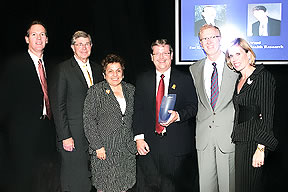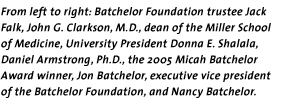Pioneering Neurocognitive
interventions
Armstrong Receives 2005 Batchelor Children’s Health Research
Award
![]() n
2004 Daniel Armstrong, Ph.D., associate chair of the Department of
Pediatrics and director of the Mailman Center for Child Development,
applauded the
achievements of Gwendolyn Scott, M.D., the dedicated pediatrician who
won the first Micah Batchelor Award for Excellence in Children’s
Health Research. This time it was his turn to receive the acclaim.
n
2004 Daniel Armstrong, Ph.D., associate chair of the Department of
Pediatrics and director of the Mailman Center for Child Development,
applauded the
achievements of Gwendolyn Scott, M.D., the dedicated pediatrician who
won the first Micah Batchelor Award for Excellence in Children’s
Health Research. This time it was his turn to receive the acclaim.
 |
||
 |
Armstrong, an internationally recognized leader in the field of neurocognitive function in children, was named the 2005 Batchelor Award winner. Armstrong and collaborators at the University and a number of other institutions have worked for nearly 20 years to determine how diseases and the treatments for the diseases affect the developing brain. Much of his work has involved collaboration with investigators from around the United States as part of large, multi-center clinical trials. These studies have provided much of what is known about the relationship between chronic diseases of childhood and learning difficulties.
The late George E. Batchelor, a renowned aviation entrepreneur and philanthropist, established the Micah Batchelor Award for Excellence in Children’s Health Research in memory of his cherished grandson, Micah. Started with a $5 million endowment, each year at least $300,000 is awarded to a University of Miami investigator conducting research in children’s diseases and working in the Batchelor Children’s Research Institute. This is one of the largest awards in the nation for children’s health research.
![]()
George Batchelor’s longtime financial commitment to the University of Miami Miller School of Medicine, and in particular the Department of Pediatrics, is largely responsible for the establishment of the Batchelor Children’s Research Institute.
“George Batchelor believed that this Department of Pediatrics is a great place for children to receive care. More importantly, he believed that this is a place where the great changes in the kinds of care that children receive can be advanced,” Armstrong says. “This award is one example of the vision Mr. Batchelor held for our department. I am deeply appreciative and honored to have been selected to carry a small part of this vision forward on behalf of George Batchelor, the Batchelor Foundation, and all the children who will benefit from his vision as it unfolds.”
Armstrong and his research team will use the award to develop innovative approaches to measuring specific neurocognitive function in children with chronic illnesses. In addition, Armstrong plans to develop and evaluate the effectiveness of age-specific neurocognitive interventions that will promote normal brain development during the critical period when disease and treatment are believed to permanently interfere with that development.